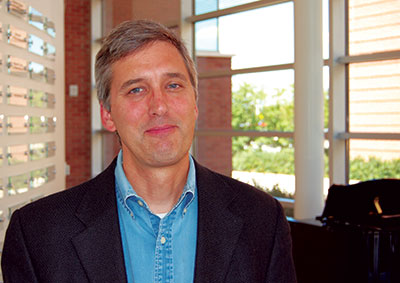Q&A with Matthew Wynia
Leading the CU Center for Bioethics and Humanities
By Dan Meyers
 (
(
Q: What example do you use to illustrate for people how you think about ethics in health care?
A:
There are reasons to consider charging patients a drug copay, to give them some “skin in the game” around health care spending decisions. But for her, charging a copay for these particular medications was both medically and ethically wrong, and making her think twice about filling her prescriptions was a terrible business
This case shows how health care, policy
Say more about the connection between health care and the bigger picture.
You can’t disentangle what it means to be a health
This is why bioethics ends up grappling with issues
How did you become interested in this area?
When I was an undergraduate at the University of Oregon my majors were biology and philosophy. I was aiming for medical school. For my undergraduate degree, I had to write a thesis. I started reading about bioethics and ended up writing about the topic of paternalism in medicine. Ever
What drew you to CU and this role?
The groundbreaking work of CU in interprofessional education and training was a big draw. There are also a number of individuals here whom I’ve known for some time, and whose work I’ve admired, and I’m excited by the opportunity to join them.
CU also has a unique role, not only within Colorado but also in the region and nationally, which makes it appealing for building a program in humanities and bioethics with a focus on public engagement and policy issues.
How do you begin a job like this, especially coming from outside Colorado?
I’ll spend my first months listening and learning, creating a foundation to build on. I want to identify ways to engage not just the Anschutz campus but also the broader community in discussions and presentations.
Health care is getting complicated, and CU is launching into the realm of personalized medicine. Peering into patients’ genetic makeup leads to both precision care and questions about privacy. Does all that point to the kind of work the center does?
Certainly. I would also say that, in addition to privacy concerns, there are very complex and interesting interactions between issues at the level of the individual and community. Many personal health issues have strong connections to broader forces such as economics, community
Take obesity. There are genetic factors at play, but there are also factors related to the microbiome—the trillions of bacteria that live on and inside us. The microbiome is connected to personalized medicine because it seems to affect epigenetics, which is how our genes are activated or deactivated. But the microbiome is also related to the environment and policy decisions, and decisions by health professionals about antibiotic use, and so on.
Then, superimposed on these issues, there are many social factors that impact obesity in individuals, like whether you have a grocery store in your neighborhood, whether it’s safe for you to get out and exercise, the types of advertisements there are in your neighborhood, etc.
What’s more, these individual and social factors are so intertwined that we shouldn’t look at them too much in isolation. Your social environment affects what you eat; what you eat affects your microbiome; your microbiome affects your genes; your genes make you fat. That’s obviously a huge oversimplification but
Some might think of changes in health care as being driven by technology. You seem to be saying there’s a lot more to it.
Many personal medical issues today are no longer easily resolved with purely technical knowledge. They require weighing values, assessing priorities and making decisions where there might not be one right answer for everyone. For these types of questions, which some have called “wicked problems” and others call “complex adaptive challenges,” multiple types of expertise must be involved in figuring out the best way forward.
That includes the expertise that members of the public bring to the conversation. As the health care system continues to evolve, it seems clear there will be an increasing push for public and individual engagement in health issues that we used to simply entrust to health professionals. I see the role of the university and the center as critical to bringing all those voices together in a forum.
The word “humanities” is in the title of the center you now lead. You oversee an art gallery and the site for lectures and discussions in the Fulginiti Pavilion. How does that tie
Arts and humanities are central to the mission. Literature, art, music, film—all are ways of connecting with the human experience of being in the health care environment, whether as a patient or a professional. All convey the type of knowledge and understanding you often can’t get from a textbook.
The arts and humanities program, under Dr. Tess Jones’ direction, has traditionally been a very strong part of the portfolio of activities at the center, and I see that continuing and even growing as we move forward.
Define what success will look like in the coming year.
For the next year, which is a transition year for me, success will be the development of a clear, shared vision for the work of the center and how it fits into the university and the larger community. I’ll be working closely with the deans of the schools, the centers on campus, the bioethics center’s Community Advisory Board, the core faculty and staff, and other stakeholders to make a plan for growth that makes sense to everyone.
And I will be looking for ways to measure the effectiveness of what we’re doing. I’m a big believer in measurement, even when what you are trying to measure might seem nebulous. For example, much of my research to this point has focused on figuring out how to measure the ethical climate of health care organizations.